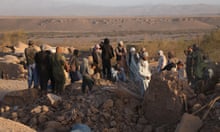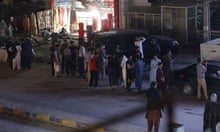A powerful earthquake in a remote area of Afghanistan’s Paktika province has killed at least 1,000 people and injured at least 1,500, with the toll expected to rise in the impoverished country.
According to Taliban officials, hundreds more were injured in what appears to have been the deadliest quake in two decades, striking during the night with heavy rain hampering rescue efforts.
The disaster comes as Afghanistan grapples with a severe economic crisis that has gripped it since the Taliban takeover last year, and amid rapidly mounting concerns over the ability of the Taliban and international agencies to respond quickly.
While major international agencies still operate in Afghanistan, the Taliban takeover saw other agencies and governments reduce their assistance programmes in a country where some 80% of the budget came from foreign assistance.
Footage from Paktika showed people being carried into helicopters to be airlifted from the area. Others were treated on the ground. One resident could be seen receiving IV fluids while sitting in a plastic chair outside the rubble of his home and still more were sprawled on stretchers.
Describing the aftermath as people dug through the rubble to retrieve the dead and injured, Mohammad Amin Huzaifa, the head of the information and culture department in Paktika said: “People are digging grave after grave” with footage released by the Taliban showed residents digging a long slit trench to bury the dead.
Karim Nyazai was in the provincial capital and returned immediately to find his village devastated and 22 members of his extended family dead.
“I was away from my family who live in a remote village in the Gyan district. I went there as soon as I could find a car in the early morning,” he told the Guardian.
“The entire village is buried. Those who could manage to get out before everything fell down were managing to take out the bodies of their loved ones out of the rubble. There were bodies wrapped in blankets everywhere.
“I lost 22 members of my [extended family] including my sister, and three of my brothers. More than 70 people in the village died.”
One survivor, Arup Khan, 22, who was pulled out of a collapsed guesthouse, described the moment the earthquake struck. “It was a horrible situation. There were cries everywhere. The children and my family were under the mud.”
In the immediate aftermath of the disaster, Bilal Karimi, a deputy spokesperson for the Taliban government, called for aid agencies to assist with the emergency efforts. “We urge all aid agencies to send teams to the area immediately to prevent further catastrophe,” he said.
In response, the UN and EU were quick to offer help.
“Inter-agency assessment teams have already been deployed to a number of affected areas,” tweeted the UN office for humanitarian affairs in Afghanistan.
Tomas Niklasson, the EU special envoy for Afghanistan, tweeted: “The EU is monitoring the situation and stands ready to coordinate and provide EU emergency assistance to people and communities affected.”
With photographs from the area showing collapsed houses and bodies being dug out of the rubble, a tribal leader from Paktika province, Yaqub Manzor, said survivors and rescuers were scrambling to help those affected.
“The local markets are closed and all the people have rushed to the affected areas,” Manzor told the AFP news agency by telephone.
The Afghan prime minister, Mohammad Hassan Akhund, convened an emergency meeting at the presidential palace to coordinate the relief effort for victims in Paktika and Khost, a neighbouring province.
Earlier, Abdul Wahid Rayan, the director general of the Bakthar news agency, said the areas hit by the earthquake were in mountainous regions, meaning rescue work required helicopters.
But he added: “Afghanistan has a shortage of helicopters and these areas being hard to access is making relief work difficult.”
Rayan said 90 houses had been destroyed in Gayan, a district in the north of Paktika.
The centre of the earthquake – estimated by Pakistan to have had a magnitude of 6.1 and 5.9 by the US Geological Survey – occurred about 30 miles south-west of the city of Khost. It occurred at the relatively shallow depth of 6 miles, worsening its impact.
Tremors were noticed in neighbouring countries, with “strong and long jolts” felt in the Afghan capital, Kabul, according to a resident who posted on the website of the European-Mediterranean Seismological Centre.
Deaths were also reported in the eastern provinces of Khost and Nangarhar, said Mohammad Nassim Haqqani, the head of the Afghan disaster-response authority.
Rescue efforts are likely to be complicated since many international aid agencies left Afghanistan after the Taliban took control last year and the chaotic withdrawal of the US military from the longest war in its history. Rescuers rushed to the area by helicopter.
The death toll, given by Afghan emergency official Mawlawi Sharafuddin Muslim, made it the deadliest quake since 2002, when a 6.1-magnitude tremor killed about 1,000 people in northern Afghanistan, immediately after the US-led invasion overthrew the Taliban government after the 9/11 attacks.
Pakistan’s prime minister, Shehbaz Sharif, offered his condolences over the earthquake in a statement, saying his nation would provide help to the Afghan people. At the Vatican, Pope Francis offered prayers for all those killed and injured and for the “suffering of the dear Afghan population”.
Afghanistan and the larger region of south Asia along the Hindu Kush mountains has long been vulnerable to devastating earthquakes.
In response to the new regime, many nations imposed sanctions on Afghanistan’s banking sector and cut billions of dollars worth of development aid. Humanitarian aid has continued, however, with international agencies such as the UN still operating.








